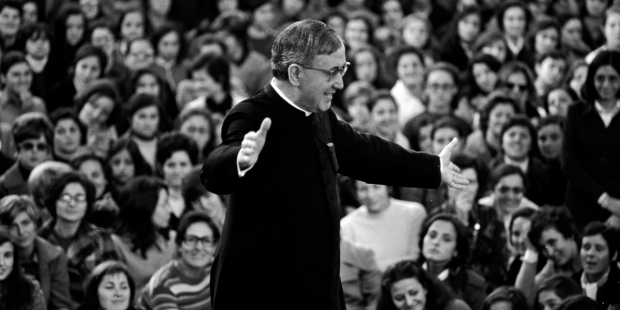5 ways to sanctify your daily life with St. Josemaría Escrivá

Known as the patron saint of ordinary life, Josemaría was convinced that our circumstances were no obstacle to holiness.
The founder of Opus Dei had a conviction, present in all his writings: the holiness to which "ordinary" Christians are called is not a minor holiness. It is an invitation to become someone who is "contemplative in the midst of the world". And yes, St. Josemaría believed that it was possible, as long as these five steps were followed.
1
LOVE THE REALITY OF YOUR CURRENT CIRCUMSTANCES
"Do you really want to be a saint?" asked Saint Josemaría. "Carry out the little duties of each moment: do what you should and focus on what you are doing." Later, he will further develop this realistic and specific perspective of holiness in the midst of the world in his homily Passionately Loving the World:
“Leave behind false idealisms, fantasies and what I usually call 'mystical wishful thinking': if only I hadn't married; if only I had a different job or degree; if only I were in better health; if only you were younger; if only I were older. Instead, turn to the more material and immediate reality, which is where you will find the Lord “.
This "saint of the ordinary" invites us to truly immerse ourselves in the adventure of daily life: "There is no other way, my daughters and sons: either we learn to find our Lord in ordinary life, every day, or not we will never find it. "
2
DISCOVER “SOMETHING DIVINE” HIDDEN IN THE DETAILS
As Pope Benedict XVI liked to remember, "God is near". This is also the path along which St. Josemaría would gently guide his interlocutors:
"We live as if it were far away, in the heavens above, and we forget that it is also continually at our side." How can we find him, how can we establish a relationship with him? "You understand well: there is something holy, something divine hidden in the most ordinary situations, and it is up to each of you to discover it."
Ultimately, it is a question of transforming all the circumstances, both pleasant and unpleasant, of ordinary life into a source of dialogue with God and, therefore, into a source of contemplation: "But that ordinary work, which is your own companion, the workers they do - it must be a constant prayer for you. It has the same lovely words, but a different melody every day. Our mission is to transform the prose of this life into poetry, into heroic verses “.
3
FIND UNITY IN LIFE
For St. Josemaría, the aspiration to an authentic life of prayer is intimately linked to the search for personal improvement, through the acquisition of human virtues "linked together in a life of grace". Patience with a rebellious teenager, a sense of friendship and the ability to fascinate in relationships with others, serenity in the face of painful failures: this is, according to Josemaria, the "raw material" of our dialogue with God, the playground of sanctification. It is a question of “materializing one's spiritual life” to avoid the temptation to lead “a kind of double life: on the one hand, an interior life, a life linked to God; and on the other hand, as something separate and distinct, your professional, social and family life, made up of small earthly realities “.
A dialogue that appears in The Way illustrates this invitation very well: “You ask me: why that wooden Cross? - And I copy from a letter: 'As I look up from the microscope, my sight stops on the cross, black and empty. That Cross without its Crucifix is a symbol. It has a meaning that others cannot see. And even if I am tired and on the point of giving up work, I look back at the objective and continue: because the solitary Cross asks for a pair of shoulders to support it ».
4
SEE CHRIST IN OTHERS
Our daily life is essentially a life of relationships - family, friends, colleagues - which are sources of happiness and inevitable tension. According to St. Josemaría, the secret lies in learning “to recognize Christ when he comes to meet us in our brothers, in the people around us… No man or woman is a single verse; we all invent a divine poem that God writes with the collaboration of our freedom “.
From that moment on, even daily relationships acquire an unsuspected dimensionality. "-Child. —The sick. —Writing these words, don't you feel tempted to capitalize them? Because, for a soul in love, children and the sick are Him “. And from that internal and continuous dialogue with Christ comes the impulse to speak to others about him: "The apostolate is the love of God, which overflows and gives itself to others".
5
DO IT ALL FOR LOVE
"Everything that is done out of love becomes beautiful and grand." This is undoubtedly the last word of St. Josemaría's spirituality. It's not about trying to do great things or waiting for extraordinary circumstances to behave heroically. Rather, it is a matter of humbly striving in the small duties of each moment, putting into it all the love and human perfection of which we are capable.
St. Josemaría particularly liked to refer to the image of the donkey riding at the carnival whose apparently monotonous and useless life is actually extraordinarily fertile:
“What blessed perseverance the carnival donkey has! - Always at the same pace, walking in the same circles again and again. - Day after day, always the same. Without that, there would be no fruit ripening, no freshness in the orchards, no aromas in the gardens. Bring this thought into your inner life. "